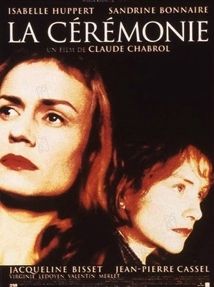La Cérémonie - Claude Chabrol
 (Photo source) La Cérémonie (1995) by the great Claude Chabrol, known as the 'French Hitchcock', and Caroline Eliacheff was based on and adapted from Ruth Rendell’s Judgment in Stone. Chabrol's interest in thrillers was not particularly in the source of the plot itself nor in the suspense but in exploring the psychology of murder. He was motivated by what he called "the confrontation between character and story". The focus was on personality and how the camera could best express the inner attitudes of his leads. Chabrol was a 'woman’s director' and Isabelle Huppert, his most regular partner, was at her very best in La Cérémonie - definitely one of his most disturbing and unforgettable masterpieces which won numerous international awards.
(Photo source) La Cérémonie (1995) by the great Claude Chabrol, known as the 'French Hitchcock', and Caroline Eliacheff was based on and adapted from Ruth Rendell’s Judgment in Stone. Chabrol's interest in thrillers was not particularly in the source of the plot itself nor in the suspense but in exploring the psychology of murder. He was motivated by what he called "the confrontation between character and story". The focus was on personality and how the camera could best express the inner attitudes of his leads. Chabrol was a 'woman’s director' and Isabelle Huppert, his most regular partner, was at her very best in La Cérémonie - definitely one of his most disturbing and unforgettable masterpieces which won numerous international awards.
What could have been a juicy thriller in the hands of any other director is a truly haunting masterpiece of observant social commentary on the eternal confrontation between rich and poor in the hands of Chabrol. It was his 49th film and labelled jokingly by Chabrol as France's 'last Marxist film'.
The site Strictly Film School gives this synopsis:
A young woman named Sophie (Sandrine Bonnaire) is interviewed for a housekeeping position at the country estate of Catherine Lelievre (Jacqueline Bisset) and her family. Sophie is enigmatically succinct in her answers, but her references are highly complimentary, and she is immediately offered the job. However, from the onset, it is evident that there is something odd about Sophie's behavior. She has an instinctive, patent response of "I don't know" to most questions, even when the answer does not apply. She refuses to dust the books in the library, despite keeping the rest of the house impeccably clean. She prefers to wash the dishes by hand instead of using the dishwasher. When she is given the opportunity to take driving lessons, she claims to have poor vision and declines the offer. Georges Lelievre (Jean-Pierre Cassel) sends her to an optometrist for an eye examination, but she avoids the appointment, and spends the afternoon shopping around town. One day, she is left a note on the kitchen table, and the truth becomes evident - Sophie cannot read. In an attempt to conceal her illiteracy from everyone, she becomes increasingly withdrawn from her employers, and the deception and lies compound. Inevitably, her friendship with an eccentric, interfering postal worker named Jeanne (Isabelle Huppert), a woman of dubious character, grows unnaturally close, and the relationship leads to an incomprehensible act.
Claude Chabrol explores the themes of isolation and loneliness in La Ceremonie. The film's opening credits roll against the landscape shot of Madame Lelievre's car traversing the empty road leading to the remote estate. In essence, the geographic location is a reflection of Sophie's alienation from the Lelievre family, as she attempts to keep her illiteracy a secret. Sophie's long walks to town and her affinity for watching television serve, not as pleasant diversions from the emptiness and boredom of the house, but as a means of distraction and evasion. Her relationship with the disreputable Jeanne stems from a mutual sense of maladjustment and disaffection. La Ceremonie is an elegant, haunting, and tragic tale of a woman driven by personal insecurity down a path of destruction and despair. It is the road to ruin.
Why was it called La Cérémonie? Well, because this was the name given by the French to events leading up to an execution by guillotine. "Although," says Roger Ebert, "there are no guillotines in this film, there is a relentless feeling to it, as if the characters are engaged in a performance that can have only one outcome." You can read Ebert's superb review/analysis HERE, along with another take on it HERE from The New York Times and yet another HERE in The Guardian.
Isabelle Huppert (Jeanne), Sandrine Bonnaire (Sophie), Jacqueline Bisset (Catherine Lelievre), Jean-Pierre Cassel (Georges Lelievre), Virginie Ledoyen (Melinda Lelievre) and Valentin Merlet (Gilles Lelievre)
Director of photography: Bernard Zitzermann; Edited by Monique Fardoulis; Music by Mathieu Chabrol; Produced by Marin Karmitz
Tempted? You should be! The film (111 minutes) can be seen HERE in its entirety (youtube) and is also available via Netflix. Just a word of warning - don't watch it before bedtime!

/https%3A%2F%2Fstorage.canalblog.com%2F33%2F16%2F508287%2F95344135_o.jpg)
/https%3A%2F%2Fstorage.canalblog.com%2F52%2F26%2F508287%2F95342137_o.jpg)
/https%3A%2F%2Fstorage.canalblog.com%2F42%2F99%2F508287%2F95342518_o.jpg)
/https%3A%2F%2Fstorage.canalblog.com%2F97%2F52%2F508287%2F55786848_o.jpg)
/https%3A%2F%2Fstorage.canalblog.com%2F33%2F68%2F508287%2F55786597_o.jpg)
/https%3A%2F%2Fstorage.canalblog.com%2F40%2F91%2F508287%2F98712362_o.jpg)
/https%3A%2F%2Fstorage.canalblog.com%2F38%2F76%2F508287%2F83379594_o.jpg)
/https%3A%2F%2Fstorage.canalblog.com%2F92%2F69%2F508287%2F69301410_o.jpg)
/https%3A%2F%2Fstorage.canalblog.com%2F20%2F26%2F508287%2F69021436_o.jpg)